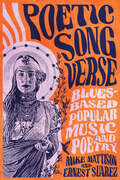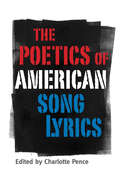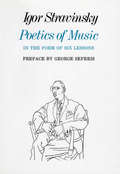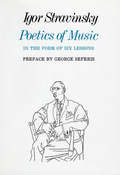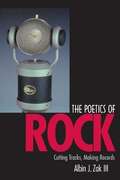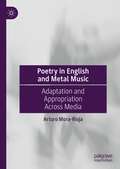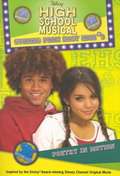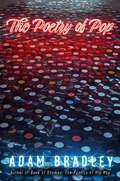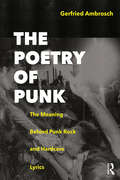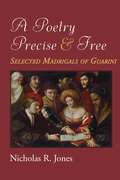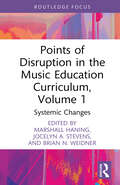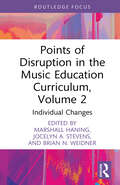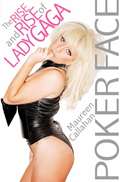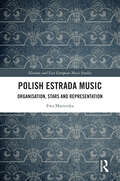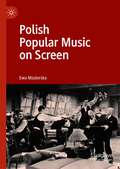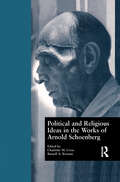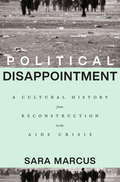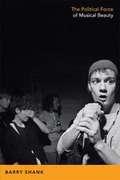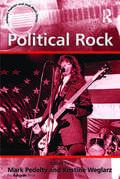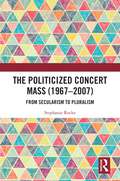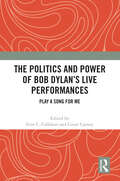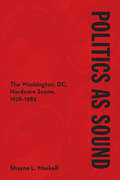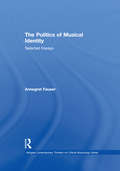- Table View
- List View
Poetic Song Verse: Blues-Based Popular Music and Poetry
by Mike Mattison Ernest SuarezPoetic Song Verse: Blues-Based Popular Music and Poetry invokes and critiques the relationship between blues-based popular music and poetry in the twentieth and twenty-first centuries. The volume is anchored in music from the 1960s, when a concentration of artists transformed modes of popular music from entertainment to art-that-entertains. Musician Mike Mattison and literary historian Ernest Suarez synthesize a wide range of writing about blues and rock—biographies, histories, articles in popular magazines, personal reminiscences, and a selective smattering of academic studies—to examine the development of a relatively new literary genre dubbed by the authors as “poetic song verse.” They argue that poetic song verse was nurtured in the fifties and early sixties by the blues and in Beat coffee houses, and matured in the mid-to-late sixties in the art of Bob Dylan, the Beatles, the Rolling Stones, the Doors, Jimi Hendrix, Joni Mitchell, Leonard Cohen, Gil Scott-Heron, Van Morrison, and others who used voice, instrumentation, arrangement, and production to foreground semantically textured, often allusive, and evocative lyrics that resembled and engaged poetry. Among the questions asked in Poetic Song Verse are: What, exactly, is this new genre? What were its origins? And how has it developed? How do we study and assess it? To answer these questions, Mattison and Suarez engage in an extended discussion of the roots of the relationship between blues-based music and poetry and address how it developed into a distinct literary genre. Unlocking the combination of richly textured lyrics wedded to recorded music reveals a dynamism at the core of poetic song verse that can often go unrealized in what often has been considered merely popular entertainment. This volume balances historical details and analysis of particular songs with accessibility to create a lively, intelligent, and cohesive narrative that provides scholars, teachers, students, music influencers, and devoted fans with an overarching perspective on the poetic power and blues roots of this new literary genre.
The Poetics of American Song Lyrics (American Made Music Series)
by Charlotte PenceThe Poetics of American Song Lyrics is the first collection of academic essays that regards songs as literature and that identifies intersections between the literary histories of poems and songs. The essays by well-known poets and scholars including Pulitzer Prize winner Claudia Emerson, Peter Guralnick, Adam Bradley, David Kirby, Kevin Young, and many others, locate points of synthesis and separation so as to better understand both genres and their crafts. The essayists share a desire to write on lyrics in a way that moves beyond sociological, historical, and autobiographical approaches and explicates songs in relation to poetics. Unique to this volume, the essays focus not on a single genre but on folk, rap, hip hop, country, rock, indie, soul, and blues. The first section of the book provides a variety of perspectives on the poetic history and techniques within songs and poems, and the second section focuses on a few prominent American songwriters such as Bob Dylan, Bruce Springsteen, and Michael Stipe. Through conversational yet in-depth analyses of songs, the essays discuss sonnet forms, dramatic monologues, Modernism, ballads, blues poems, confessionalism, Language poetry, Keatsian odes, unreliable narrators, personas, poetic sequences, rhythm, rhyme, transcription methods, the writing process, and more. While the strategies of explication differ from essay to essay, the nexus of each piece is an unveiling of the poetic history and poetic techniques within songs.
Poetics of Music
by Igor Stravinsky Arthur Knodel Ingolf DahlThese lessons provide penetrating glimpses into the thought processes of Stravinsky's mind. While dealing with his chosen topics-the phenomenon of music, the composition of music, musical typology, the avatars of Russian music, and the performance of music-he reveals his reverence for tradition, order and discipline. He believes 'the more art is controlled, limited, worked over, the more it is free. His opinions about Wagner, Verdi, Berlioz, Hindemith, Weber, Beethoven, Glinka, Tchaikovsky, Moussorgsky and Bach are refreshing. He also analyzes the function of the critic, the requirements of the interpreter, the state of Russian music, and musical taste and snobbery." - The American Recorder Once again the concertgoer and music lover can take pleasure in Igor Stravinsky's thoughts on the essentials of music. It was over thirty years ago that Stravinsky delivered the Charles Eliot Norton Lectures at Harvard University on which the French-language edition of this book and later the English translation by Arthur Knodel and Ingolf Dahl were based. Now his Poetics of Music is available in paper-with a preface by George Seferis.
Poetics of Music in the Form of Six Lessons (Charles Eliot Norton Lectures (hup) Ser. #2003)
by Igor StravinskyOne of the greatest of contemporary composers has here set down in delightfully personal fashion his general ideas about music and some accounts of his own experience as a composer. Every concert-goer and lover of music will take keen pleasure in his notes about the essential features of music, the process of musical composition, inspiration, musical types, and musical execution. Throughout the volume are to he found trenchant comments on such subjects as Wagnerism, the operas of Verdi, musical taste, musical snobbery, the influence of political ideas on Russian music under the Soviets, musical improvisation as opposed to musical construction, the nature of melody, and the function of the critic of music. Musical people of every sort will welcome this first presentation in English of an unusually interesting book.
The Poetics of Rock: Cutting Tracks, Making Records
by Albin J. Zak IIIA fascinating exploration of recording consciousness and compositional process. It examines the crucial roles played by recording technologies in the construction of rock music and shows how songwriters, musicians, engineers, and producers contribute to the creative project.
Poetry in English and Metal Music: Adaptation and Appropriation Across Media
by Arturo Mora-RiojaMany metal songs incorporate poetry into their lyrics using a broad array of techniques, both textual and musical. This book develops a novel adaptation, appropriation, and quotation taxonomy that both expands our knowledge of how poetry is used in metal music and is useful for scholars across adaptation studies broadly. The text follows both a quantitative and a qualitative approach. It identifies 384 metal songs by 224 bands with intertextual ties to 146 poems written by fifty-one different poets, with a special focus on Edgar Allan Poe, John Milton's Paradise Lost and the work of WWI's War Poets. This analysis of transformational mechanisms allows poetry to find an afterlife in the form of metal songs and sheds light on both the adaptation and appropriation process and on the semantic shifts occasioned by the recontextualisation of the poems into the metal music culture. Some musicians reuse – and sometimes amplify – old verses related to politics and religion in our present times; others engage in criticism or simple contradiction. In some cases, the bands turn the abstract feelings evoked by the poems into concrete personal experiences. The most adventurous recraft the original verses by changing the point of view of either the poetic voice or the addressed actors, altering the vocaliser of the narrative or the gender of the protagonists. These mechanisms help metal musicians make the poems their own and adjust them to their artistic needs so that the resulting product is consistent with the expectations of the metal music culture.
Poetry in Motion (High School Musical: Stories from East High #3)
by Alice AlfonsiEveryone at East High is freaking out. In one week, the students in Ms. Barrington's English class will have to recite an original poem in front of the whole school! Chad is usually happy to ham it up no matter who is watching, but the embarrassing memory of a past poetry performance is seared onto his brain--and he's not sure he'll be able to pull off this assignment. Troy enlists Gabriella to teach Chad and the other basketball players that there's more than one way to bust a rhyme. But will she be able to save them from schoolwide humiliation?
The Poetry of Pop
by Adam BradleyA trailblazing exploration of the poetic power of popular songs, from Tin Pan Alley to the Beatles to Beyonc#65533; and beyond. Encompassing a century of recorded music, this pathbreaking book reveals the poetic artistry of popular songs. Pop songs are music first. They also comprise the most widely disseminated poetic expression of our time. Adam Bradley traces the song lyric across musical genres from early twentieth-century Delta blues to mid-century rock 'n' roll to today's hits. George and Ira Gershwin's "Fascinating Rhythm. " The Rolling Stones' "(I Can't Get No) Satisfaction. " Rihanna's "Diamonds. " These songs are united in their exacting attention to the craft of language and sound. Bradley shows that pop music is a poetry that must be heard more than read, uncovering the rhythms, rhymes, and metaphors expressed in the singing voice. At once a work of musical interpretation, cultural analysis, literary criticism, and personal storytelling, this book illustrates how words and music come together to produce compelling poetry, often where we least expect it.
The Poetry of Punk: The Meaning Behind Punk Rock and Hardcore Lyrics
by Gerfried AmbroschPunk bands have produced an abundance of poetic texts, some crude, some elaborate, in the form of song lyrics. These lyrics are an ideal means by which to trace the developments and explain the conflicts and schisms that have shaped, and continue to shape, punk culture. They can be described as the community’s collective ‘poetic voice,’ and they come in many different forms. Their themes range from romantic love to emotional distress to radical politics. Some songs are intended to entertain, some to express strong feelings, some to provoke, some to spread awareness, and some to foment unrest. Most have an element of confrontation, of kicking against the pricks. Socially and epistemologically, they play a central role in the scene’s internal discourse, shaping communities and individual identities. The Poetry of Punk is an investigation into the Anglophone punk culture, specifically in the UK and the US, where punk originated in the mid-1970s, its focus being on the song lyrics written and performed by punk rock and hardcore artists.
A Poetry Precise and Free: Selected Madrigals of Guarini
by Nicholas JonesA Poetry Precise and Free collects 150 lyric poems by the Renaissance Italian poet Giovanni Battista Guarini in new translations, accompanied by the Italian originals and commentary that will enlighten and engage both scholars and general readers. Guarini’s madrigals provide insight into northern Italian court culture of the late Renaissance, when poetry and music were enjoyed as companion arts. Hundreds of composers of Guarini’s day set his lyric poems to music. Primarily known today in their vocal settings, most famously those of Claudio Monteverdi, the poems merit appreciation in their own right. This volume is organized into ten sections, grouping the madrigals around themes such as the anguish of passion, the asymmetry of desire, the incursions of jealousy, and the possibility of mutual bliss. Nicholas R. Jones renders Guarini’s poetry into accessible contemporary English verse that nevertheless stays true to the substance and form of the original texts, reflecting their roots in the Petrarchan poetic tradition and displaying the emotion and musicality that made these lyrics so popular from the start. A substantive introduction provides cultural context for the madrigals and their musical settings; brief commentaries follow each translation to illuminate aspects of poetic and rhetorical craft. An extensive appendix lists the madrigal compositions that set these lyrics for vocal performance. The book fills a major gap in the scholarship on Guarini’s literary legacy. It will appeal to scholars of literature, Renaissance studies, and musicology, early-music performers, and general readers interested in poetry and classical music.
Points of Disruption in the Music Education Curriculum, Volume 1: Systemic Changes (CMS Pedagogies and Innovations)
by Marshall Haning Jocelyn A. Stevens Brian N. WeidnerFor decades, scholars in the field of music education have recognized the need for growth and change in our approach to teaching music, yet despite these calls for change, the music education curriculum today remains remarkably similar to that of a century ago. Points of Disruption in the Music Education Curriculum, Volume 1: Systemic Changes is one of two volumes that bring together applied suggestions, analyses, and best practices for disrupting cycles of replication in the curriculum of K-12 and collegiate music education programs in the United States and beyond, considering disruption as a force for positive change. Identifying specific strategies for interrupting or reimagining traditional practices, the contributors provide music teachers and music educators with a variety of potential practical approaches to creating changes that foster a better musical education at all levels of the curriculum.This first volume focuses on systemic changes, including topics like professional development, hiring practices, ableism and universal design, rhizomatic learning, and how to implement disruption across the music education profession. Each chapter contains specific action steps and suggestions for implementation. Bringing together five thought-provoking chapters, this concise volume offers a diverse set of concrete strategies that will be useful to a wide range of music education stakeholders, including teachers, administrators, and curriculum designers.
Points of Disruption in the Music Education Curriculum, Volume 2: Individual Changes (CMS Pedagogies and Innovations)
by Marshall Haning Jocelyn A. Stevens Brian N. WeidnerFor decades, scholars in the field of music education have recognized the need for growth and change in our approach to teaching music, yet despite these calls for change, the music education curriculum today remains remarkably similar to that of a century ago. Points of Disruption in the Music Education Curriculum, Volume 2: Individual Changes is one of two volumes that bring together applied suggestions, analyses, and best practices for disrupting cycles of replication in the curriculum of K-12 and collegiate music education programs in the United States and beyond, considering disruption as a force for positive change. Identifying specific strategies for interrupting or reimagining traditional practices, the contributors provide music teachers and music educators with a variety of potential practical approaches to creating changes that foster a better musical education at all levels of the curriculum.This second volume focuses on changes that can be implemented by individual educators, covering topics including transcultural approaches, student-teacher power relations, methods courses, integrated music education, and administrator support of teacher agency, student–teacher power relations, and reimagining music education. Bringing together 6 thought-provoking chapters, this book offers a diverse set of concrete strategies that will be useful to a wide range of music education stakeholders, including teachers, administrators, and curriculum designers.
Poker Face: The Rise and Rise of Lady Gaga
by Maureen CallahanIn just a two-year span, Stefani Germanotta, a struggling performer in New York's Lower East Side burlesque scene, has become the global demographic-smashing pop icon known as Lady Gaga. She is a once-in-a-decade artist, a gifted singer, composer, designer, and performance artist who mixes high and low culture, the avant-garde with the accessible, authenticity with artifice.Who is Lady Gaga? She is a twenty-five-year-old woman whose stage mantra--"I'm a free bitch!"--is the polar opposite of who she is offstage: isolated, insecure, and unable to be alone. She is an outrÉ artist who wanted to be a sensitive singer-songwriter. She is a woman who says no man can ever compete with her career, but who goes back and forth with the ex-boyfriend who said she was too ambitious. She claims not to care what people think, but spends her downtime online, reading what people have to say about her. She claims to be a con artist and utterly authentic. She is never less than compelling.Based on more than fifty original interviews with friends, employees, rivals, and music industry veterans, Poker Face is the first in-depth biography of the extraordinary cultural phenomenon that is Lady Gaga.
Polish Estrada Music: Organisation, Stars and Representation (Slavonic and East European Music Studies)
by Ewa MazierskaPolish estrada music dominated Polish popular music throughout the state socialist period but gained little attention from popular music scholars because it was regarded as being of low quality and politically conformist. Ewa Mazierska carefully examines these assumptions, considering those institutions which catered for the needs of estrada artists and their fans, the presence of estrada in different media and the careers and styles of the leading stars, such as Mieczysław Fogg, Irena Santor, Violetta Villas, Anna German, Jerzy Połomski, Maryla Rodowicz, Zdzisława Sośnicka, Zbigniew Wodecki and Krzysztof Krawczyk. Mazierska also discusses the memory and legacy of estrada music in the post-communist period. The book draws on Poland’s cultural and political history and the history of Polish popular music and media, including television and radio. Mazierska engages with concepts such as genre, stardom and authenticity in order to capture the essence of Polish estrada music and to provide a comparison with popular music produced in other countries.
Polish Jewish Culture Beyond the Capital: Centering the Periphery
by Zehavit Stern Justin Cammy Bozena Shallcross Malgorzata Stolarska-Fronia Naomi Seidman Magdalena Kozlowska Sylwia Jakubczyk-Sleczka Marcos Silber Alicja Maslak-Maciejewska Eugenia Prokop-Janiec Ela Bauer Daniel Kupfert HellerPolish Jewish Culture beyond the Capital: Centering the Periphery is a path-breaking exploration of the diversity and vitality of urban Jewish identity and culture in Polish lands from the second half of the nineteenth century to the outbreak of the Second World War (1899–1939). In this multidisciplinary essay collection, a cohort of international scholars provides an integrated history of the arts and humanities in Poland by illuminating the complex roles Jews in urban centers other than Warsaw played in the creation of Polish and Polish Jewish culture. Each essay presents readers with the extraordinary production and consumption of culture by Polish Jews in literature, film, cabaret, theater, the visual arts, architecture, and music. They show how this process was defined by a reciprocal cultural exchange that flourished between cities at the periphery—from Lwów and Wilno to Kraków and Łódź—and international centers like Warsaw, thereby illuminating the place of Polish Jews within urban European cultures. Companion website (https://polishjewishmusic.iu.edu)
Polish Popular Music on Screen
by Ewa MazierskaThis book examines the interface between Polish popular music and screen media against the background of Polish history, cinema, and popular culture and situates that interface in a local as well as global context. It looks at Polish musicals, biographical films about musicians, documentary films and, finally, music videos. The author draws attention to the immense popularity of musical comedies in Polish interwar cinema, the enduring appeal of musical genres during the period of state socialism, despite their low status in film criticism, and the re-birth of musicals in the 2010s. Mazierska also discusses the most important stars, directors and authors of songs presented in Polish films, and points to the effect of technological changes on inception and transformation of music-centred genres of screen media, including the effect of YouTube on their growth and preservation. The book is informed by the question of how parochial and universal is Polish popular music and its screen representation.
Political and Religious Ideas in the Works of Arnold Schoenberg (Border Crossings #Vol. 5)
by Daniel Albright Charlotte M. Cross Russell A. BermanThe original essays in this collection chronicle the transformation of Arnold Schoenberg's works from music as pure art to music as a vehicle of religious and political ideas, during the first half of the twentieth century. This interdisciplinary volume includes contributions from musicologists, music theorists, and scholars of German literature and of Jewish studies.
Political Beethoven
by Nicholas MathewMusicians, music lovers and music critics have typically considered Beethoven's overtly political music as an aberration; at best, it is merely notorious, at worst, it is denigrated and ignored. In Political Beethoven Nicholas Mathew returns to the musical and social contexts of the composer's political music throughout his career – from the early marches and anti-French war songs of the 1790s to the grand orchestral and choral works for the Congress of Vienna – to argue that this marginalized functional art has much to teach us about the lofty Beethovenian sounds that came to define serious music in the nineteenth century. Beethoven's much-maligned political compositions, Mathew shows, lead us into the intricate political and aesthetic contexts that shaped all of his oeuvre, thus revealing the stylistic, ideological and psycho-social mechanisms that gave Beethoven's music such a powerful voice – a voice susceptible to repeated political appropriation, even to the present day.
Political Disappointment: A Cultural History from Reconstruction to the AIDS Crisis
by Sara Marcus“Political Disappointment is an abundant text, overflowing with Sara Marcus’s considerable gifts. She is adept at presenting history and narrative with equal clarity; her writing is urgent but also optimistic. This is a book that is sometimes painful but never sacrifices hope or beauty.”—Hanif AbdurraqibMoving from the aftermath of Reconstruction through the AIDS crisis, a new cultural history of the United States shows how artists, intellectuals, and activists turned political disappointment—the unfulfilled desire for change—into a basis for solidarity.Sara Marcus argues that the defining texts in twentieth-century American cultural history are records of political disappointment. Through insightful and often surprising readings of literature and sound, Marcus offers a new cultural history of the last century, in which creative minds observed the passing of moments of possibility, took stock of the losses sustained, and fostered intellectual revolutions and unexpected solidarities.Political Disappointment shows how, by confronting disappointment directly, writers and artists helped to produce new political meanings and possibilities. Marcus first analyzes works by W. E. B. Du Bois, Charles Chesnutt, Pauline Hopkins, and the Fisk Jubilee Singers that expressed the anguish of the early Jim Crow era, during which white supremacy thwarted the rebuilding of the country as a multiracial democracy. In the ensuing decades, the Popular Front work songs and stories of Lead Belly and Tillie Olsen, the soundscapes of the civil rights and Black Power movements, the feminist poetry of Audre Lorde and Adrienne Rich, and the queer art of Marlon Riggs and David Wojnarowicz continued building the century-long archive of disappointment. Marcus shows how defeat time and again gave rise to novel modes of protest and new forms of collective practice, keeping alive the dream of a better world.Disappointment has proved to be a durable, perhaps even inevitable, feature of the democratic project, yet so too has the resistance it precipitates. Marcus’s unique history of the twentieth century reclaims the unrealized desire for liberation as a productive force in American literature and life.
The Political Force of Musical Beauty
by Barry ShankIn The Political Force of Musical Beauty, Barry Shank shows how musical acts and performances generate their own aesthetic and political force, creating, however fleetingly, a shared sense of the world among otherwise diverse listeners. Rather than focusing on the ways in which music enables the circulation of political messages, he argues that communities grounded in the act and experience of listening can give rise to new political ideas and expression. Analyzing a wide range of "beautiful music" within popular and avant-garde genres--including the Japanese traditions in the music of Takemitsu Toru and Yoko Ono, the drone of the Velvet Underground, and the insistence of hardcore punk and Riot grrrl post-punk--Shank finds that when it fulfills the promise of combining sonic and lyrical differences into a cohesive whole, musical beauty has the power to reorganize the basis of social relations and produce communities that recognize meaningful difference.
Political Rock (Ashgate Popular and Folk Music Series)
by Kristine WeglarzPolitical Rock features luminary figures in rock music that have stood out not only for their performances, but also for their politics. The book opens with a comparative, cultural history of artists who have played important roles in social movements. Individual chapters are devoted to The Clash and Fugazi, Billy Bragg, Bob Dylan, Rage Against the Machine, Pearl Jam, Sinead O'Connor, Peter Gabriel, Ani DiFranco, Bruce Cockburn, Steve Earle and Kim Gordon. These artists have been chosen for their status as rock musicians and connections to political moments, movements, and art. The artists and authors show that rock retains a critical strain, continuing a tradition of rock politics that matters to fans, activists, and movements alike.
The Politicized Concert Mass (1967-2007): From Secularism to Pluralism
by Stephanie RockeSince the transformative 1960s, concert masses have incorporated a range of political and religious views that mirror their socio-cultural context. Those of the long 1960s (c1958-1975) reflect non-conformism and social activism; those of the 1980s, environmentalism; those of the 1990s, universalism; and those of the 2000s, cultural pluralism. Despite utilizing a format with its roots in the Roman Catholic liturgy, many of these politicized concert masses also reflect the increasing religious diversification of Western societies. By introducing non-Catholic and often non-Christian beliefs into masses that also remain respectful of Christian tradition, composers in the later twentieth century have employed the genre to promote a conciliatory way of being that promotes the value of heterogeneity and reinforces the need to protect the diversity of musics, species and spiritualities that enrich life. In combining the political with the religious, the case studies presented pose challenges for both supporters and detractors of the secularization paradigm. Overarchingly, they demonstrate that any binary division that separates life into either the religious or the secular and promotes one over the other denies the complexity of lived experience and constitutes a diminution of what it is to be human.
The Politics and Power of Bob Dylan’s Live Performances: Play a Song for Me
by Erin C Callahan Court CarneyEphemeral by nature, the concert setlist is a rich, if underexplored, text for scholarly research. How an artist curates a show is a significant aspect of any concert’s appeal. Through the placement of songs, variations in order, or the omission of material, Bob Dylan’s setlists form a meta-narrative speaking to the power and significance of his music. These essays use the setlists from concerts throughout Dylan’s career to study his approach to his material from the 1960s to the 2020s. These chapters, from various disciplinary perspectives, illustrate how the concert setlist can be used as a source to explore many aspects of Dylan’s public life. Finally, this collection provides a new method to examine other musicians across genres with an interdisciplinary approach to setlists and the selectivity of performance. Unique in its approach and wide-ranging scholarly methodology, this book deepens our understanding of Bob Dylan, the performer.
Politics as Sound: The Washington, DC, Hardcore Scene, 1978-1983 (Music in American Life)
by Shayna MaskellUncompromising and innovative, hardcore punk in Washington, DC, birthed a new sound and nurtured a vibrant subculture aimed at a specific segment of the city's youth. Shayna L. Maskell explores DC's hardcore scene during its short but storied peak. Led by bands like Bad Brains and Minor Threat, hardcore in the nation's capital unleashed music as angry and loud as it was fast and minimalistic. Maskell examines the music's aesthetics and the unique impact of DC's sociopolitical realities on the sound and the scene that emerged. As she shows, aspects of the music's structure merged with how bands performed it to put across distinctive representations of race, class, and gender. But those representations could be as complicated and contradictory as they were explicit. A fascinating analysis of a punk rock hotbed, Politics as Sound tells the story of how a generation created music that produced--and resisted--politics and power.
The Politics of Musical Identity: Selected Essays (Ashgate Contemporary Thinkers On Critical Musicology)
by Annegret FauserThis volume explores the way in which composers, performers, and critics shaped individual and collective identities in music from Europe and the United States from the 1860s to the 1950s. Selected essays and articles engage with works and their reception by Richard Wagner, Georges Bizet (in an American incarnation), Lili and Nadia Boulanger, William Grant Still, and Aaron Copland, and with performers such as Wanda Landowska and even Marilyn Monroe. Ranging in context from the opera house through the concert hall to the salon, and from establishment cultures to counter-cultural products, the main focus is how music permits new ways of considering issues of nationality, class, race, and gender. These essays - three presented for the first time in English translation - reflect the work in both musical and cultural studies of a distinguished scholar whose international career spans the Atlantic and beyond.
